Fishing could be finished for me and my young son
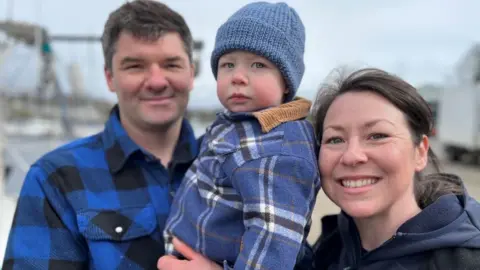 BBC
BBCCallum Elliott is a fisherman on the west coast of Scotland but he's worried about the future for himself and his 18-month-old son Angus.
His village of Tarbert in Argyll is built around the harbour and its small boats like Callum's trawler Sea Spray.
But in recent years the town has lost its chandlery, fish sales office and 60% of the fleet.
Local fishing grounds are being squeezed by a rise in the number of salmon farms, an expanding offshore wind sector and now by plans to protect the seabed by closing another 10% of the waters.
This fishing community has lived with the restriction of marine protected areas (MPAs) since 2016 but the Scottish government now proposes "highly protected" marine areas (HPMAs) where all commercial activity would be banned.
Callum says: "If we were left to do what we'd like to do under the rules and regulations that are currently in place there could be a great future but we need the government to work with us.
"If they carry on down the path they are, it's finished for me and it's finished for Angus."
The campaign group Open Seas wants better management plans which show clearly where the seas are protected and where fishing is allowed.
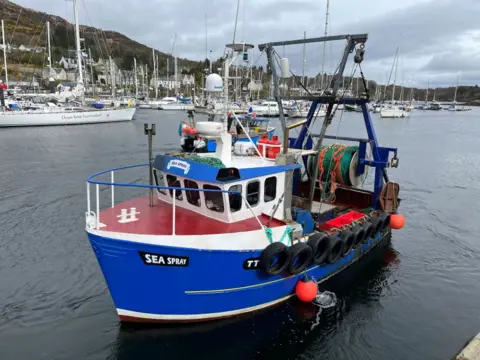
Callum, 37, comes from a farming background but felt the calling of the sea from a young age.
Ten years ago this week he took out a six-figure bank loan to buy his small trawler but feels there's now too little support for traditional fishing communities.
Cabling from wind turbines, seaweed farming and the presence of military bases have all heaped pressure on the same marine space meaning it's becoming squeezed.
Many fishermen feel they are being left the dregs once the seas have been divided up by other industries.
Callum says: "It used to be a job that, in my eyes, was respected but now you're almost ashamed to say that you're a fisherman."
Some believe restrictions are necessary and that a shift to "low impact" fishing would be beneficial to both the marine environment and the industry.
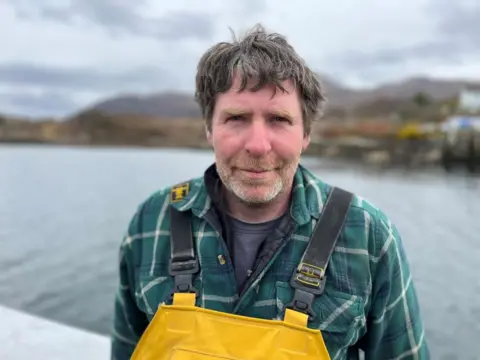
Bally Philp operates a creel boat out of Kyleakin harbour on the Isle of Skye and sells his high-value langoustines to restaurants across the UK.
Creel fishing can be described as "low-impact" and involves leaving pots on the seabed from which the prawns can't escape and then collecting them again when they are full.
He agrees with Callum that it is hard to invest in the industry when it is unclear what the future looks like.
But there the agreement between them ends because Bally would ban Callum's trawl boat from Scotland's inshore waters.
He advocates re-introducing a ban on trawling and dredging within three miles of the shore where the marine eco-system is most sensitive.
Bally says the fish stocks have dwindled through mismanagement of the seas and that creel fishing would be a more sustainable option.
He says: "We use the space better than anyone else in terms of the amount of people that we can employ and the very small impact that we have on the marine environment.
"We shouldn't be competing with the likes of scallop dredgers or prawn trawlers. And if you get that right you can have fishing and conservation in the same space."
Prawns caught alive by creelers like Bally can be sold for as much as four times the value of the same shellfish caught in nets.
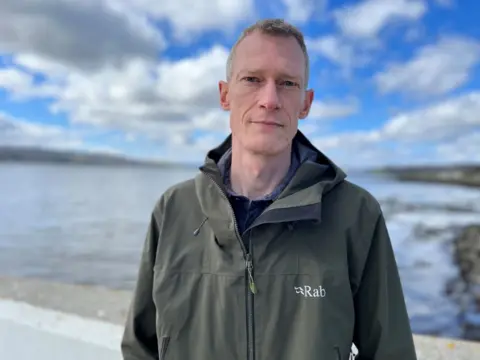
The campaign group Open Seas has published a report called Ease the Squeeze which examines how Scotland's waters could be divided up.
It says the Scottish government has failed to adequately implement spatial management plans which show clearly where the seas are protected and where fishing is allowed.
The report calls for a "robust and coherent" plan which includes areas designated as "Go Fish Zones" alongside conservation measures.
It says low impact fishing should be given prioritised access in those designated areas.
Nick Underdown from Open Seas told BBC Scotland: "The evidence is clear that over 80% of Scotland's seas are disturbed or highly disturbed and that needs addressed.
"The piecemeal of policies do not amount to a coherent spatial management plan which is what is required for our seas."
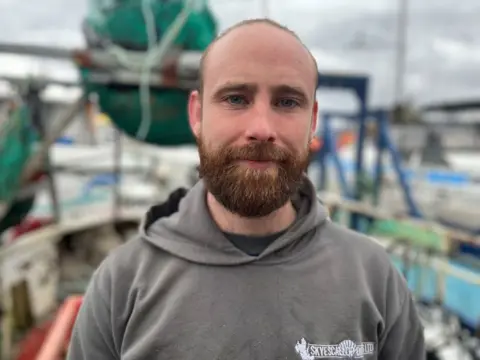
Thirty-year-old James Cameron has been diving for scallops for five years.
He lives in Staffin and is part of a three-strong tag-team which operates from a small dive boat out of Kyleakin.
If HPMAs are introduced in the area, he believes the business would become unviable.
He said: "We'd have to move the boat and we all live here. This is where our homes and families are. If it's not in this area, other boats would come in and that's a big pressure on us.
"We manage the grounds very carefully. If there were more boats moving into the area, all that planning falls apart."
Other industries say they too are feeling the squeeze from the increased demands on the marine space.
Salmon Scotland said it was worried it may have to move fish farms out of newly-protected areas while Scottish Renewables said its industry's expansion cannot happen in a way which treats other users of the sea unfairly.
A consultation on HPMAs ends next week.
The Scottish government said fairness must be at the heart of its plan for reducing greenhouse gas emissions and it had been engaging closely with the fishing industry.
A spokeswoman added: "Becoming net zero by 2045 will transform all sectors of our economy and society. But with careful planning and close working with communities, business, industry, we will ensure that this economic transformation is managed fairly for workers in existing industries."